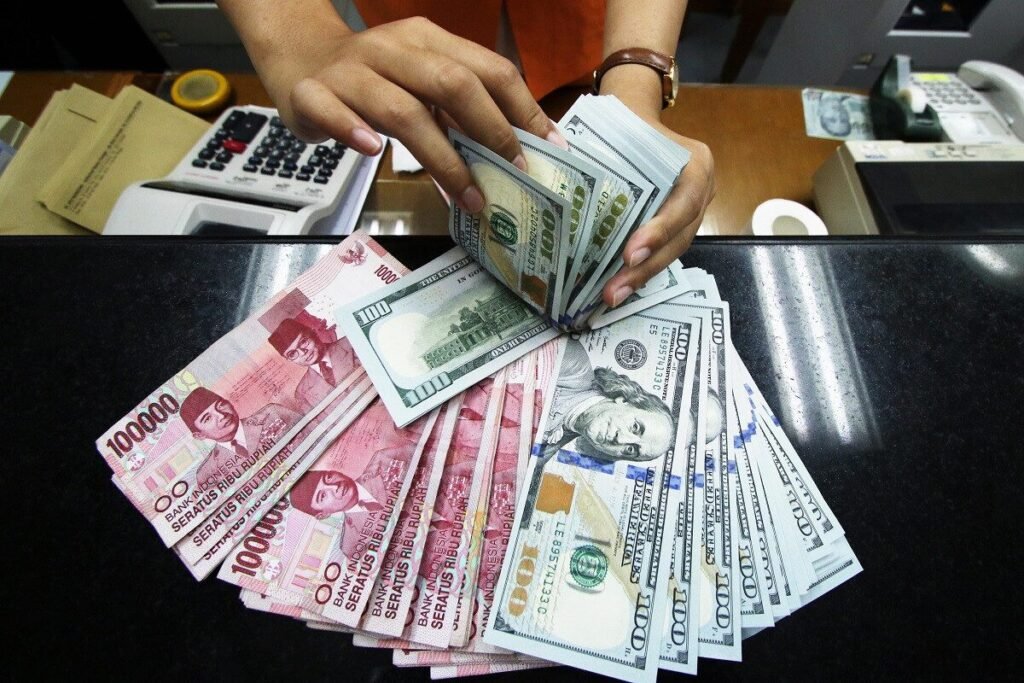Navigating Currency in Indonesia: Forex Trading vs Money Exchange Explained
July 6, 2025

While both deal with currency, the difference between forex trading and money exchange lies in their function and purpose. In Indonesia, forex trading is typically done online through digital platforms and brokerage firms, often with the intent to profit from currency fluctuations. It’s speculative and market-driven. On the other hand, money exchange — done through physical money changers — is transactional and used for practical needs like travel, remittance, or business payments. These two methods may seem similar, but their audiences, risks, and operations are worlds apart.
Forex Indonesia: How does forex trading work in Indonesia?
Forex trading in Indonesia refers to the buying and selling of currency pairs through regulated brokers, often using digital trading platforms. It functions as part of the global financial system and offers access to currency markets 24 hours a day, five days a week. A forex trader might, for example, buy USD while selling IDR, hoping to profit if the dollar strengthens. Transactions happen virtually — no physical cash is involved. Users rely on platforms, leverage, and market analysis to time their entries and exits.
The accessibility of forex trading in Indonesia has grown, especially among tech-savvy youth and remote workers. However, it’s important to trade only through licensed brokers regulated by BAPPEBTI (Badan Pengawas Perdagangan Berjangka Komoditi). These rules are designed to prevent fraud and ensure that traders understand the risks involved. In contrast to money changers, forex traders aim for profit rather than utility — and that’s a critical distinction in understanding forex Indonesia today.
Forex Indonesia: How do money changers work, and who uses them?

Source: The Jakarta Post
Money changers offer face-to-face currency exchange. You walk into a store or kiosk with Indonesian rupiah and walk out with foreign banknotes — or vice versa. It’s simple, tangible, and commonly used by tourists, overseas students, migrant workers, and businesses dealing with international suppliers. These outlets often post exchange rates prominently, and some allow for modest negotiation.
Licensed money changers in Indonesia are regulated by Bank Indonesia. That means they must follow transparency rules and adhere to strict anti-money laundering policies. Unlike forex trading platforms, there’s no speculation or leverage involved. For most people looking to buy foreign currency for immediate use, this is the most convenient option. It’s a good example of currency exchange that serves the real economy, not just financial speculation.
Forex Indonesia: What are the regulatory differences in Indonesia?

Source: Banksinarmas
In Indonesia, the legal framework for both forex and money exchange services is strong but handled by different agencies. Bank Indonesia oversees traditional money changers, ensuring they comply with identification checks, reporting procedures, and rate transparency. Any unlicensed currency exchange operator is considered illegal, regardless of location or popularity.
Forex trading, however, is monitored by BAPPEBTI, the country’s commodity futures regulator. Only registered brokers may offer forex trading to Indonesian residents. This legal distinction is important: trading with offshore platforms that are not recognized by the government can expose users to serious financial risks. When comparing forex Indonesia across both services, regulation is the cornerstone that shapes how safe and accessible each method is.
Which is safer or more suitable for the average person?

Source: t4trade
If your goal is safety and simplicity, money changers are often the more practical route. The process is clear, the service is direct, and the risk is minimal. It’s ideal for travel, immediate purchases, or short-term needs. On the other hand, forex trading offers the potential for returns — but comes with high volatility, steep learning curves, and the need for emotional discipline.
For everyday Indonesians unfamiliar with financial markets, a money changer is often the better choice. But for those who have studied the market and understand risk management, forex trading in Indonesia provides a window into global finance that is both modern and mobile. Whether you’re aiming for utility or income defines which is safer for your needs.
Do exchange rates differ between forex platforms and money changers?
Yes, and the differences can be significant. Money changers usually apply a spread — the difference between the buy and sell rate — as their profit margin. This is factored into the exchange rate shown at their counter. Rates may also differ between high-traffic and low-traffic areas, especially near airports or tourist zones.
Forex platforms, by contrast, reflect live interbank rates that change by the second. While these rates are often more competitive, they’re also accompanied by trading fees or broker spreads. Moreover, gains aren’t guaranteed, and the platform may apply commissions or overnight holding charges. For large-volume or real-time transactions, forex platforms can offer better rates. But for immediate physical currency needs, a licensed money changer remains reliable and transparent.
Who typically uses each option in Indonesia?
The audience for each service is quite distinct. Money changers are used by individuals with clear, short-term needs: vacationers, small traders, or family members sending money abroad. These are usually one-off or occasional transactions where simplicity is more important than timing the market.
Forex trading, meanwhile, attracts investors, hobbyists, and those looking for alternative income sources. In Indonesia, the rise of online financial education and mobile apps has brought a younger generation into this space. From university students exploring finance to entrepreneurs managing currency risk, the forex Indonesia community is growing steadily — but it’s not for everyone.
Can you use both forex trading and money changers?

Source: zforex
Yes, and many Indonesians do. Someone might trade forex digitally while also exchanging physical currency for a trip abroad. There’s no conflict — they’re simply different tools for different purposes. Just make sure to use licensed brokers and registered money changers to stay compliant with national laws.
Over time, some people shift from one to the other. A casual currency exchanger might take an interest in online forex after learning about trends or economic movements. Similarly, someone active in forex might return to physical exchange services for convenience. In both cases, understanding the tools and risks is what matters most.
Conclusion
In a country as globally connected as Indonesia, understanding the relationship between forex trading and money exchange has become more relevant than ever. While forex Indonesia includes modern digital trading, it also involves the traditional role of money changers serving local communities. Both are vital, both are legal — and both serve entirely different needs. Whether you’re navigating the airport exchange counter or watching market charts at midnight, knowing the difference can help you act smarter and stay protected in an ever-changing currency world.

